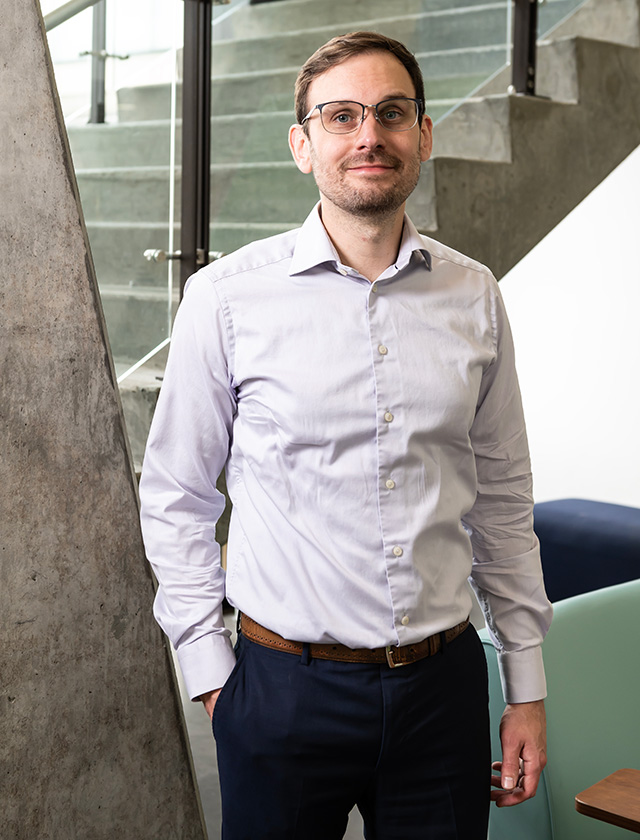
Subscribe to Pittwire Today
Get the most interesting and important stories from the University of Pittsburgh.An engineering professor who sees student potential.
When Matthew Barry took a vacation to Iceland in 2023, he had no intention of developing coursework for his students. But “there’s no such thing as turning off being an engineer,” said the Swanson School of Engineering associate professor.
“Everything I saw on this island was an example of engineering applications,” Barry said.
He was inspired to create a new worksheet for his Introduction to Thermodynamics course based on a visit to a geothermal power plant, and he developed new material for his Statics and Mechanics of Materials course based on Iceland’s innovative building techniques.
Barry took his love of the country even further and became the first Pitt faculty member to lead a student global experience to Iceland in the spring of 2025. Their weeklong excursion was the culmination of his course Sustainable Engineering in Iceland: Culture, History and Innovation. Students gained meaningful insights into Iceland’s ingenuity and the extent to which Icelanders care for the Earth in all aspects of their lives.
Exploring possibilities
This openness to possibilities has defined Barry’s career at Pitt.
Since 2017, Barry’s research group has collaborated with the Radioisotope Power Systems group at NASA’s Jet Propulsion Laboratory on supporting the development of radioisotope thermoelectric generators (RTGs). These devices have provided reliable power on NASA missions for decades, including the Mars rovers and Voyagers 1 and 2. RTGs are extremely versatile power sources and their mission environments can vary wildly from the coldness of deep space to the blazing heat of Mars.
His lab develops physics-based models to predict how RTGs perform under these varying conditions, which will enable scientists and engineers to create designs that can satisfy all future mission objectives, regardless of operating conditions
Holistic learning
As successful as he is now, viewing Barry’s undergraduate transcript wouldn’t lead you to think he was on a path to becoming an award-winning mechanical engineering and materials science professor and contributor to NASA.
“Students sometimes enter college thinking they need a 4.0 GPA to achieve their life goals, but I teach them that struggle and failure are a part of life that they can overcome with composure and grace. You have to make mistakes to learn.”
Admitting to his students that he didn’t earn straight A’s in undergrad humanizes him, Barry said.
His academic experience also informs his second research path: engineering education, through which he tries to uncover education strategies that meaningfully bolster student learning.
“I understood the mechanisms as to why I was a poor student and tried to change the classes I teach to provide those necessary modalities and resources, so that students in my situation have what they need to succeed,” he said.
Sam Wismer, a Swanson School graduate, said Barry brings passion and real-world experience to the classroom.
“He instills foundational knowledge and teaches students to think like engineers,” she said.
Wismer, who served as Barry’s teaching assistant and undergraduate research assistant, co-wrote with him an online statics and mechanics textbook based on Barry’s undergraduate experiences.
“Students learn through a variety of methods, and I try to provide them educational and structural opportunities that resonate with their mode of learning,” Barry said.
Wismer described the textbook, “Statics and Mechanics of Materials: An Example-Based Approach” as interactive.
“Our textbook provides real-time feedback on questions. Lessons are strategically tiered in a way that is optimal for progressive learning,” she said.
Barry was one of this year’s recipients of the 2025 Chancellor’s Distinguished Teaching Award based on his deep understanding of students’ struggles and his unwavering dedication to supporting students’ careers in engineering.
His teaching success is a result of his creativity and commitment, said Brian Gleeson, department chair of the Swanson Schools’ mechanical and materials science program.
“Students see the time and effort he puts into teaching. He has their respect,” he said.
Top photo by Aimee Obidzinski



